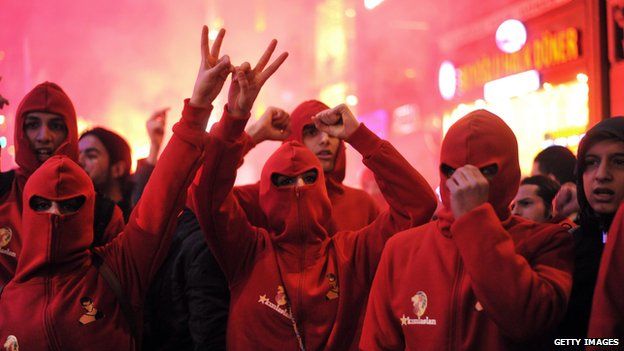Anger over new powers for Turkish authorities online
- Published

Last year Turkey entered the headlines for briefly blocking Twitter and YouTube. Now, with both unblocked, activists are using them to highlight a new set of concerns about internet freedom.
Scan the world's most popular Twitter hashtags, and the chances are some of them will be in Turkish. Many of them will also have a political bent: social media is heavily used by all sides of the spectrum in Turkey to push their side of the argument.
So it's not surprising that any attempt to regulate the internet attracts anger in Turkey. Several of the top hashtags in recent weeks have been attacking the government for precisely this. A bill that has been passed by the parliament and that is set to come into force will give Turkish government ministers the power to order that any web material deemed to be a threat to national security or public health, or liable to cause public disorder or crime, be taken offline or blocked within four hours. If they don't comply content providers risk a hefty fine or prison.
Many of those who participated in the Gezi Park protests in 2013 - largely organised on social media - are not happy. They don't buy the government's defence of the law, which is that courts need to approve any actions within 72 hours, and say Turkey's track record makes them weary. Twitter's recent Transparency Report disclosed that 90% of all the tweets taken down were in response to requests from the Turkish government (the US made the most requests for account information, mainly in relation to criminal investigations).
Turkey has a long-standing history of media control, and is currently ranked 154th out of 180 countries in the Reporters Without Borders Press Freedom Index. Philip Bennett, Director of the DeWitt Wallace Center for Media and Democracy says Turkey is becoming "the poster child for illiberal democracies expanding their assault on a free press". He sees it as part of an evolving 21st Century model of government censorship - where social media is no longer the unstoppable, global force for free speech it was once hailed to be. "Whereas once governments were playing catch-up with internet technologies, now advocates of the free flow of information are playing catch up with government efforts to suppress it," he says.
So why are the Turkish authorities keen to regulate social media? Campaigners are adamant it's all about the General Election in June, and that President Erdogan is targeting a big enough win to allow him to change the constitution. Yasin Aktay, Deputy Chairman of the ruling Justice and Development Party (the AK Party), strenuously denies this: "The opposition is very strong, there are thousands of websites which act against the government… this is accepted and welcome," he told BBC Trending.
And the law will not necessarily be applied to political opponents: in fact there is another potential player in Turkey's social media wars.
The ruling AK Party is embroiled in a messy struggle with a secretive Islamic social movement called the Gulenists or Hizmet, "the service". Hizmet are widely believed to have members in senior positions throughout the state and many believe - although it remains unproven - that Gulenists are behind a series of sensitive leaks spread through Twitter and Facebook. Early last year an audio recording posted on You Tube appeared to show top officials discussing a false flag attack inside Syria; another recording appeared to reveal President Erdogan and his son Bilal talking about how to hide large sums of money; and the details of several police and judicial operations have been posted online before they have taken place.
Dr Zeynep Tufekci, an expert in social media at North Carolina University, told BBC Trending: "They were allies, they were close allies, and these were their joint missives. Any government would be worried. Imagine if you had scientologists in the cabinet leaking information. If that happened in the US, can you imagine? They'd go nuts. It's a very legitimate concern". Hizmet deny any involvement in the leaks.
So what impact will the bill have? Erkan Saka, a communication specialist at Bilgi University, say it will reduce the strength of opposition voices. "You will see more anonymity which will mean comments have less weight. You see already that those in prominent positions, actors, actresses, and so on, are stopping political messages or making them more pro-AKP, otherwise they won't get work".
In defence of the new legislation, the government points to the need to protect the privacy and safety of citizens, and says the Turkish internet laws are no stricter than those in the US or Europe. Yasin Aktay says public protests organised on social media have led to deaths: "In the 90's people were asking for more freedom… if you go to the same cities now people are asking for security, they say we have too much freedom now".
Blog by Jo Mathys
You can follow BBC Trending on Twitter @BBCtrending, and find us on Facebook. All our stories are at bbc.com/trending.